Refine search
No keyword found to refine search
keywords EN
Places
Names
219 documents found
| 1 | 4 |
Documents per page :
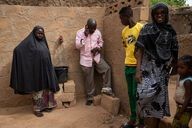
Prepaid meters and mobile application in Niger
Nicolas Réméné / Le Pictorium
LePictorium_0282565.jpg
In the Goudel Maourey district of Niamey in Niger, "smart" water meters have been installed, enabling each family to pay for its water consumption as it occurs, using a mobile phone and an application. This type of prepaid meter allows local residents to regulate their consumption according to their income. This makes it possible to offer access to drinking water at home at a lower cost, with a prepayment system adapted to the irregular incomes of a large proportion of disadvantaged urban populations. In these working-class neighbourhoods on the outskirts of the city centre, access to water is often difficult. The drinking water kiosks installed in family concessions provide access to quality running water for all daily needs. In Niamey, Niger, during the hot season, between the beginning of March and the end of May, many neighbourhoods experience water cuts several times a day, and in some outlying areas these cuts can last for several days. This makes it very difficult for residents to meet their drinking water needs. Residents are obliged to go and buy water from the fountain operators who run standpipes in the neighbourhoods. Temperatures at this time of year can reach 45-47°C, making the water shortage even more difficult.
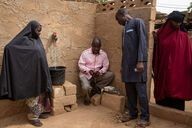
Prepaid meters and mobile application in Niger
Nicolas Réméné / Le Pictorium
LePictorium_0282566.jpg
In the Goudel Maourey district of Niamey in Niger, "smart" water meters have been installed, enabling each family to pay for its water consumption as it occurs, using a mobile phone and an application. This type of prepaid meter allows local residents to regulate their consumption according to their income. This makes it possible to offer access to drinking water at home at a lower cost, with a prepayment system adapted to the irregular incomes of a large proportion of disadvantaged urban populations. In these working-class neighbourhoods on the outskirts of the city centre, access to water is often difficult. The drinking water kiosks installed in family concessions provide access to quality running water for all daily needs. In Niamey, Niger, during the hot season, between the beginning of March and the end of May, many neighbourhoods experience water cuts several times a day, and in some outlying areas these cuts can last for several days. This makes it very difficult for residents to meet their drinking water needs. Residents are obliged to go and buy water from the fountain operators who run standpipes in the neighbourhoods. Temperatures at this time of year can reach 45-47°C, making the water shortage even more difficult.
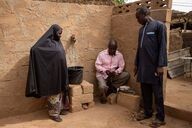
Prepaid meters and mobile application in Niger
Nicolas Réméné / Le Pictorium
LePictorium_0282567.jpg
In the Goudel Maourey district of Niamey in Niger, "smart" water meters have been installed, enabling each family to pay for its water consumption as it occurs, using a mobile phone and an application. This type of prepaid meter allows local residents to regulate their consumption according to their income. This makes it possible to offer access to drinking water at home at a lower cost, with a prepayment system adapted to the irregular incomes of a large proportion of disadvantaged urban populations. In these working-class neighbourhoods on the outskirts of the city centre, access to water is often difficult. The drinking water kiosks installed in family concessions provide access to quality running water for all daily needs. In Niamey, Niger, during the hot season, between the beginning of March and the end of May, many neighbourhoods experience water cuts several times a day, and in some outlying areas these cuts can last for several days. This makes it very difficult for residents to meet their drinking water needs. Residents are obliged to go and buy water from the fountain operators who run standpipes in the neighbourhoods. Temperatures at this time of year can reach 45-47°C, making the water shortage even more difficult.
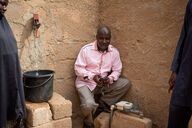
Prepaid meters and mobile application in Niger
Nicolas Réméné / Le Pictorium
LePictorium_0282568.jpg
In the Goudel Maourey district of Niamey in Niger, "smart" water meters have been installed, enabling each family to pay for its water consumption as it occurs, using a mobile phone and an application. This type of prepaid meter allows local residents to regulate their consumption according to their income. This makes it possible to offer access to drinking water at home at a lower cost, with a prepayment system adapted to the irregular incomes of a large proportion of disadvantaged urban populations. In these working-class neighbourhoods on the outskirts of the city centre, access to water is often difficult. The drinking water kiosks installed in family concessions provide access to quality running water for all daily needs. In Niamey, Niger, during the hot season, between the beginning of March and the end of May, many neighbourhoods experience water cuts several times a day, and in some outlying areas these cuts can last for several days. This makes it very difficult for residents to meet their drinking water needs. Residents are obliged to go and buy water from the fountain operators who run standpipes in the neighbourhoods. Temperatures at this time of year can reach 45-47°C, making the water shortage even more difficult.
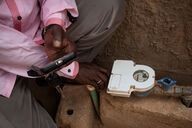
Prepaid meters and mobile application in Niger
Nicolas Réméné / Le Pictorium
LePictorium_0282569.jpg
In the Goudel Maourey district of Niamey in Niger, "smart" water meters have been installed, enabling each family to pay for its water consumption as it occurs, using a mobile phone and an application. This type of prepaid meter allows local residents to regulate their consumption according to their income. This makes it possible to offer access to drinking water at home at a lower cost, with a prepayment system adapted to the irregular incomes of a large proportion of disadvantaged urban populations. In these working-class neighbourhoods on the outskirts of the city centre, access to water is often difficult. The drinking water kiosks installed in family concessions provide access to quality running water for all daily needs. In Niamey, Niger, during the hot season, between the beginning of March and the end of May, many neighbourhoods experience water cuts several times a day, and in some outlying areas these cuts can last for several days. This makes it very difficult for residents to meet their drinking water needs. Residents are obliged to go and buy water from the fountain operators who run standpipes in the neighbourhoods. Temperatures at this time of year can reach 45-47°C, making the water shortage even more difficult.
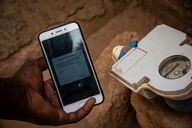
Prepaid meters and mobile application in Niger
Nicolas Réméné / Le Pictorium
LePictorium_0282570.jpg
In the Goudel Maourey district of Niamey in Niger, "smart" water meters have been installed, enabling each family to pay for its water consumption as it occurs, using a mobile phone and an application. This type of prepaid meter allows local residents to regulate their consumption according to their income. This makes it possible to offer access to drinking water at home at a lower cost, with a prepayment system adapted to the irregular incomes of a large proportion of disadvantaged urban populations. In these working-class neighbourhoods on the outskirts of the city centre, access to water is often difficult. The drinking water kiosks installed in family concessions provide access to quality running water for all daily needs. In Niamey, Niger, during the hot season, between the beginning of March and the end of May, many neighbourhoods experience water cuts several times a day, and in some outlying areas these cuts can last for several days. This makes it very difficult for residents to meet their drinking water needs. Residents are obliged to go and buy water from the fountain operators who run standpipes in the neighbourhoods. Temperatures at this time of year can reach 45-47°C, making the water shortage even more difficult.
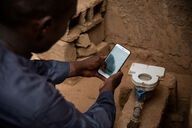
Prepaid meters and mobile application in Niger
Nicolas Réméné / Le Pictorium
LePictorium_0282571.jpg
In the Goudel Maourey district of Niamey in Niger, "smart" water meters have been installed, enabling each family to pay for its water consumption as it occurs, using a mobile phone and an application. This type of prepaid meter allows local residents to regulate their consumption according to their income. This makes it possible to offer access to drinking water at home at a lower cost, with a prepayment system adapted to the irregular incomes of a large proportion of disadvantaged urban populations. In these working-class neighbourhoods on the outskirts of the city centre, access to water is often difficult. The drinking water kiosks installed in family concessions provide access to quality running water for all daily needs. In Niamey, Niger, during the hot season, between the beginning of March and the end of May, many neighbourhoods experience water cuts several times a day, and in some outlying areas these cuts can last for several days. This makes it very difficult for residents to meet their drinking water needs. Residents are obliged to go and buy water from the fountain operators who run standpipes in the neighbourhoods. Temperatures at this time of year can reach 45-47°C, making the water shortage even more difficult.
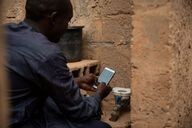
Prepaid meters and mobile application in Niger
Nicolas Réméné / Le Pictorium
LePictorium_0282572.jpg
In the Goudel Maourey district of Niamey in Niger, "smart" water meters have been installed, enabling each family to pay for its water consumption as it occurs, using a mobile phone and an application. This type of prepaid meter allows local residents to regulate their consumption according to their income. This makes it possible to offer access to drinking water at home at a lower cost, with a prepayment system adapted to the irregular incomes of a large proportion of disadvantaged urban populations. In these working-class neighbourhoods on the outskirts of the city centre, access to water is often difficult. The drinking water kiosks installed in family concessions provide access to quality running water for all daily needs. In Niamey, Niger, during the hot season, between the beginning of March and the end of May, many neighbourhoods experience water cuts several times a day, and in some outlying areas these cuts can last for several days. This makes it very difficult for residents to meet their drinking water needs. Residents are obliged to go and buy water from the fountain operators who run standpipes in the neighbourhoods. Temperatures at this time of year can reach 45-47°C, making the water shortage even more difficult.
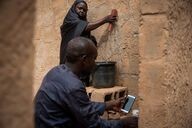
Prepaid meters and mobile application in Niger
Nicolas Réméné / Le Pictorium
LePictorium_0282573.jpg
In the Goudel Maourey district of Niamey in Niger, "smart" water meters have been installed, enabling each family to pay for its water consumption as it occurs, using a mobile phone and an application. This type of prepaid meter allows local residents to regulate their consumption according to their income. This makes it possible to offer access to drinking water at home at a lower cost, with a prepayment system adapted to the irregular incomes of a large proportion of disadvantaged urban populations. In these working-class neighbourhoods on the outskirts of the city centre, access to water is often difficult. The drinking water kiosks installed in family concessions provide access to quality running water for all daily needs. In Niamey, Niger, during the hot season, between the beginning of March and the end of May, many neighbourhoods experience water cuts several times a day, and in some outlying areas these cuts can last for several days. This makes it very difficult for residents to meet their drinking water needs. Residents are obliged to go and buy water from the fountain operators who run standpipes in the neighbourhoods. Temperatures at this time of year can reach 45-47°C, making the water shortage even more difficult.
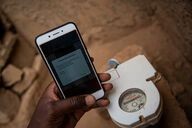
Prepaid meters and mobile application in Niger
Nicolas Réméné / Le Pictorium
LePictorium_0282574.jpg
In the Goudel Maourey district of Niamey in Niger, "smart" water meters have been installed, enabling each family to pay for its water consumption as it occurs, using a mobile phone and an application. This type of prepaid meter allows local residents to regulate their consumption according to their income. This makes it possible to offer access to drinking water at home at a lower cost, with a prepayment system adapted to the irregular incomes of a large proportion of disadvantaged urban populations. In these working-class neighbourhoods on the outskirts of the city centre, access to water is often difficult. The drinking water kiosks installed in family concessions provide access to quality running water for all daily needs. In Niamey, Niger, during the hot season, between the beginning of March and the end of May, many neighbourhoods experience water cuts several times a day, and in some outlying areas these cuts can last for several days. This makes it very difficult for residents to meet their drinking water needs. Residents are obliged to go and buy water from the fountain operators who run standpipes in the neighbourhoods. Temperatures at this time of year can reach 45-47°C, making the water shortage even more difficult.
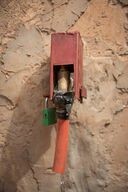
Prepaid meters and mobile application in Niger
Nicolas Réméné / Le Pictorium
LePictorium_0282575.jpg
In the Goudel Maourey district of Niamey in Niger, "smart" water meters have been installed, enabling each family to pay for its water consumption as it occurs, using a mobile phone and an application. This type of prepaid meter allows local residents to regulate their consumption according to their income. This makes it possible to offer access to drinking water at home at a lower cost, with a prepayment system adapted to the irregular incomes of a large proportion of disadvantaged urban populations. In these working-class neighbourhoods on the outskirts of the city centre, access to water is often difficult. The drinking water kiosks installed in family concessions provide access to quality running water for all daily needs. In Niamey, Niger, during the hot season, between the beginning of March and the end of May, many neighbourhoods experience water cuts several times a day, and in some outlying areas these cuts can last for several days. This makes it very difficult for residents to meet their drinking water needs. Residents are obliged to go and buy water from the fountain operators who run standpipes in the neighbourhoods. Temperatures at this time of year can reach 45-47°C, making the water shortage even more difficult.
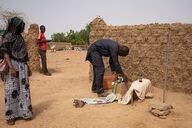
Prepaid meters and mobile application in Niger
Nicolas Réméné / Le Pictorium
LePictorium_0282576.jpg
In the Goudel Maourey district of Niamey in Niger, "smart" water meters have been installed, enabling each family to pay for its water consumption as it occurs, using a mobile phone and an application. This type of prepaid meter allows local residents to regulate their consumption according to their income. This makes it possible to offer access to drinking water at home at a lower cost, with a prepayment system adapted to the irregular incomes of a large proportion of disadvantaged urban populations. In these working-class neighbourhoods on the outskirts of the city centre, access to water is often difficult. The drinking water kiosks installed in family concessions provide access to quality running water for all daily needs. In Niamey, Niger, during the hot season, between the beginning of March and the end of May, many neighbourhoods experience water cuts several times a day, and in some outlying areas these cuts can last for several days. This makes it very difficult for residents to meet their drinking water needs. Residents are obliged to go and buy water from the fountain operators who run standpipes in the neighbourhoods. Temperatures at this time of year can reach 45-47°C, making the water shortage even more difficult.
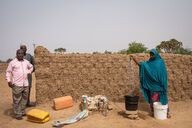
Prepaid meters and mobile application in Niger
Nicolas Réméné / Le Pictorium
LePictorium_0282577.jpg
In the Goudel Maourey district of Niamey in Niger, "smart" water meters have been installed, enabling each family to pay for its water consumption as it occurs, using a mobile phone and an application. This type of prepaid meter allows local residents to regulate their consumption according to their income. This makes it possible to offer access to drinking water at home at a lower cost, with a prepayment system adapted to the irregular incomes of a large proportion of disadvantaged urban populations. In these working-class neighbourhoods on the outskirts of the city centre, access to water is often difficult. The drinking water kiosks installed in family concessions provide access to quality running water for all daily needs. In Niamey, Niger, during the hot season, between the beginning of March and the end of May, many neighbourhoods experience water cuts several times a day, and in some outlying areas these cuts can last for several days. This makes it very difficult for residents to meet their drinking water needs. Residents are obliged to go and buy water from the fountain operators who run standpipes in the neighbourhoods. Temperatures at this time of year can reach 45-47°C, making the water shortage even more difficult.
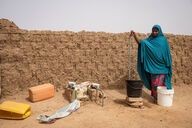
Prepaid meters and mobile application in Niger
Nicolas Réméné / Le Pictorium
LePictorium_0282578.jpg
In the Goudel Maourey district of Niamey in Niger, "smart" water meters have been installed, enabling each family to pay for its water consumption as it occurs, using a mobile phone and an application. This type of prepaid meter allows local residents to regulate their consumption according to their income. This makes it possible to offer access to drinking water at home at a lower cost, with a prepayment system adapted to the irregular incomes of a large proportion of disadvantaged urban populations. In these working-class neighbourhoods on the outskirts of the city centre, access to water is often difficult. The drinking water kiosks installed in family concessions provide access to quality running water for all daily needs. In Niamey, Niger, during the hot season, between the beginning of March and the end of May, many neighbourhoods experience water cuts several times a day, and in some outlying areas these cuts can last for several days. This makes it very difficult for residents to meet their drinking water needs. Residents are obliged to go and buy water from the fountain operators who run standpipes in the neighbourhoods. Temperatures at this time of year can reach 45-47°C, making the water shortage even more difficult.

Prepaid meters and mobile application in Niger
Nicolas Réméné / Le Pictorium
LePictorium_0282579.jpg
In the Goudel Maourey district of Niamey in Niger, "smart" water meters have been installed, enabling each family to pay for its water consumption as it occurs, using a mobile phone and an application. This type of prepaid meter allows local residents to regulate their consumption according to their income. This makes it possible to offer access to drinking water at home at a lower cost, with a prepayment system adapted to the irregular incomes of a large proportion of disadvantaged urban populations. In these working-class neighbourhoods on the outskirts of the city centre, access to water is often difficult. The drinking water kiosks installed in family concessions provide access to quality running water for all daily needs. In Niamey, Niger, during the hot season, between the beginning of March and the end of May, many neighbourhoods experience water cuts several times a day, and in some outlying areas these cuts can last for several days. This makes it very difficult for residents to meet their drinking water needs. Residents are obliged to go and buy water from the fountain operators who run standpipes in the neighbourhoods. Temperatures at this time of year can reach 45-47°C, making the water shortage even more difficult.
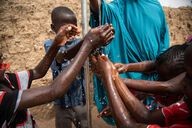
Prepaid meters and mobile application in Niger
Nicolas Réméné / Le Pictorium
LePictorium_0282580.jpg
In the Goudel Maourey district of Niamey in Niger, "smart" water meters have been installed, enabling each family to pay for its water consumption as it occurs, using a mobile phone and an application. This type of prepaid meter allows local residents to regulate their consumption according to their income. This makes it possible to offer access to drinking water at home at a lower cost, with a prepayment system adapted to the irregular incomes of a large proportion of disadvantaged urban populations. In these working-class neighbourhoods on the outskirts of the city centre, access to water is often difficult. The drinking water kiosks installed in family concessions provide access to quality running water for all daily needs. In Niamey, Niger, during the hot season, between the beginning of March and the end of May, many neighbourhoods experience water cuts several times a day, and in some outlying areas these cuts can last for several days. This makes it very difficult for residents to meet their drinking water needs. Residents are obliged to go and buy water from the fountain operators who run standpipes in the neighbourhoods. Temperatures at this time of year can reach 45-47°C, making the water shortage even more difficult.

Prepaid meters and mobile application in Niger
Nicolas Réméné / Le Pictorium
LePictorium_0282581.jpg
In the Goudel Maourey district of Niamey in Niger, "smart" water meters have been installed, enabling each family to pay for its water consumption as it occurs, using a mobile phone and an application. This type of prepaid meter allows local residents to regulate their consumption according to their income. This makes it possible to offer access to drinking water at home at a lower cost, with a prepayment system adapted to the irregular incomes of a large proportion of disadvantaged urban populations. In these working-class neighbourhoods on the outskirts of the city centre, access to water is often difficult. The drinking water kiosks installed in family concessions provide access to quality running water for all daily needs. In Niamey, Niger, during the hot season, between the beginning of March and the end of May, many neighbourhoods experience water cuts several times a day, and in some outlying areas these cuts can last for several days. This makes it very difficult for residents to meet their drinking water needs. Residents are obliged to go and buy water from the fountain operators who run standpipes in the neighbourhoods. Temperatures at this time of year can reach 45-47°C, making the water shortage even more difficult.
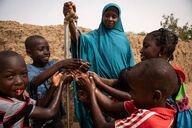
Prepaid meters and mobile application in Niger
Nicolas Réméné / Le Pictorium
LePictorium_0282582.jpg
In the Goudel Maourey district of Niamey in Niger, "smart" water meters have been installed, enabling each family to pay for its water consumption as it occurs, using a mobile phone and an application. This type of prepaid meter allows local residents to regulate their consumption according to their income. This makes it possible to offer access to drinking water at home at a lower cost, with a prepayment system adapted to the irregular incomes of a large proportion of disadvantaged urban populations. In these working-class neighbourhoods on the outskirts of the city centre, access to water is often difficult. The drinking water kiosks installed in family concessions provide access to quality running water for all daily needs. In Niamey, Niger, during the hot season, between the beginning of March and the end of May, many neighbourhoods experience water cuts several times a day, and in some outlying areas these cuts can last for several days. This makes it very difficult for residents to meet their drinking water needs. Residents are obliged to go and buy water from the fountain operators who run standpipes in the neighbourhoods. Temperatures at this time of year can reach 45-47°C, making the water shortage even more difficult.
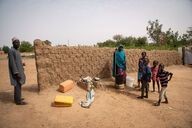
Prepaid meters and mobile application in Niger
Nicolas Réméné / Le Pictorium
LePictorium_0282583.jpg
In the Goudel Maourey district of Niamey in Niger, "smart" water meters have been installed, enabling each family to pay for its water consumption as it occurs, using a mobile phone and an application. This type of prepaid meter allows local residents to regulate their consumption according to their income. This makes it possible to offer access to drinking water at home at a lower cost, with a prepayment system adapted to the irregular incomes of a large proportion of disadvantaged urban populations. In these working-class neighbourhoods on the outskirts of the city centre, access to water is often difficult. The drinking water kiosks installed in family concessions provide access to quality running water for all daily needs. In Niamey, Niger, during the hot season, between the beginning of March and the end of May, many neighbourhoods experience water cuts several times a day, and in some outlying areas these cuts can last for several days. This makes it very difficult for residents to meet their drinking water needs. Residents are obliged to go and buy water from the fountain operators who run standpipes in the neighbourhoods. Temperatures at this time of year can reach 45-47°C, making the water shortage even more difficult.
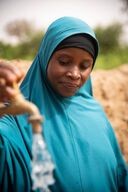
Prepaid meters and mobile application in Niger
Nicolas Réméné / Le Pictorium
LePictorium_0282584.jpg
In the Goudel Maourey district of Niamey in Niger, "smart" water meters have been installed, enabling each family to pay for its water consumption as it occurs, using a mobile phone and an application. This type of prepaid meter allows local residents to regulate their consumption according to their income. This makes it possible to offer access to drinking water at home at a lower cost, with a prepayment system adapted to the irregular incomes of a large proportion of disadvantaged urban populations. In these working-class neighbourhoods on the outskirts of the city centre, access to water is often difficult. The drinking water kiosks installed in family concessions provide access to quality running water for all daily needs. In Niamey, Niger, during the hot season, between the beginning of March and the end of May, many neighbourhoods experience water cuts several times a day, and in some outlying areas these cuts can last for several days. This makes it very difficult for residents to meet their drinking water needs. Residents are obliged to go and buy water from the fountain operators who run standpipes in the neighbourhoods. Temperatures at this time of year can reach 45-47°C, making the water shortage even more difficult.
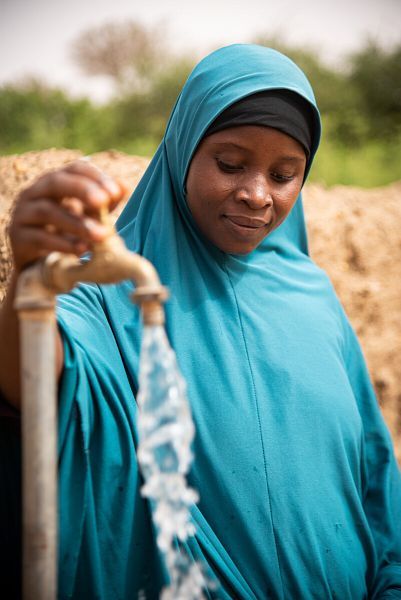
Prepaid meters and mobile application in Niger
Nicolas Réméné / Le Pictorium
LePictorium_0282585.jpg
In the Goudel Maourey district of Niamey in Niger, "smart" water meters have been installed, enabling each family to pay for its water consumption as it occurs, using a mobile phone and an application. This type of prepaid meter allows local residents to regulate their consumption according to their income. This makes it possible to offer access to drinking water at home at a lower cost, with a prepayment system adapted to the irregular incomes of a large proportion of disadvantaged urban populations. In these working-class neighbourhoods on the outskirts of the city centre, access to water is often difficult. The drinking water kiosks installed in family concessions provide access to quality running water for all daily needs. In Niamey, Niger, during the hot season, between the beginning of March and the end of May, many neighbourhoods experience water cuts several times a day, and in some outlying areas these cuts can last for several days. This makes it very difficult for residents to meet their drinking water needs. Residents are obliged to go and buy water from the fountain operators who run standpipes in the neighbourhoods. Temperatures at this time of year can reach 45-47°C, making the water shortage even more difficult.
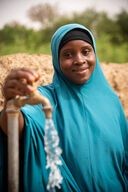
Prepaid meters and mobile application in Niger
Nicolas Réméné / Le Pictorium
LePictorium_0282586.jpg
In the Goudel Maourey district of Niamey in Niger, "smart" water meters have been installed, enabling each family to pay for its water consumption as it occurs, using a mobile phone and an application. This type of prepaid meter allows local residents to regulate their consumption according to their income. This makes it possible to offer access to drinking water at home at a lower cost, with a prepayment system adapted to the irregular incomes of a large proportion of disadvantaged urban populations. In these working-class neighbourhoods on the outskirts of the city centre, access to water is often difficult. The drinking water kiosks installed in family concessions provide access to quality running water for all daily needs. In Niamey, Niger, during the hot season, between the beginning of March and the end of May, many neighbourhoods experience water cuts several times a day, and in some outlying areas these cuts can last for several days. This makes it very difficult for residents to meet their drinking water needs. Residents are obliged to go and buy water from the fountain operators who run standpipes in the neighbourhoods. Temperatures at this time of year can reach 45-47°C, making the water shortage even more difficult.
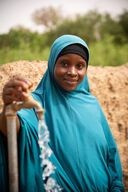
Prepaid meters and mobile application in Niger
Nicolas Réméné / Le Pictorium
LePictorium_0282587.jpg
In the Goudel Maourey district of Niamey in Niger, "smart" water meters have been installed, enabling each family to pay for its water consumption as it occurs, using a mobile phone and an application. This type of prepaid meter allows local residents to regulate their consumption according to their income. This makes it possible to offer access to drinking water at home at a lower cost, with a prepayment system adapted to the irregular incomes of a large proportion of disadvantaged urban populations. In these working-class neighbourhoods on the outskirts of the city centre, access to water is often difficult. The drinking water kiosks installed in family concessions provide access to quality running water for all daily needs. In Niamey, Niger, during the hot season, between the beginning of March and the end of May, many neighbourhoods experience water cuts several times a day, and in some outlying areas these cuts can last for several days. This makes it very difficult for residents to meet their drinking water needs. Residents are obliged to go and buy water from the fountain operators who run standpipes in the neighbourhoods. Temperatures at this time of year can reach 45-47°C, making the water shortage even more difficult.
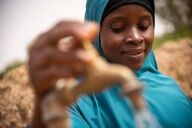
Prepaid meters and mobile application in Niger
Nicolas Réméné / Le Pictorium
LePictorium_0282588.jpg
In the Goudel Maourey district of Niamey in Niger, "smart" water meters have been installed, enabling each family to pay for its water consumption as it occurs, using a mobile phone and an application. This type of prepaid meter allows local residents to regulate their consumption according to their income. This makes it possible to offer access to drinking water at home at a lower cost, with a prepayment system adapted to the irregular incomes of a large proportion of disadvantaged urban populations. In these working-class neighbourhoods on the outskirts of the city centre, access to water is often difficult. The drinking water kiosks installed in family concessions provide access to quality running water for all daily needs. In Niamey, Niger, during the hot season, between the beginning of March and the end of May, many neighbourhoods experience water cuts several times a day, and in some outlying areas these cuts can last for several days. This makes it very difficult for residents to meet their drinking water needs. Residents are obliged to go and buy water from the fountain operators who run standpipes in the neighbourhoods. Temperatures at this time of year can reach 45-47°C, making the water shortage even more difficult.
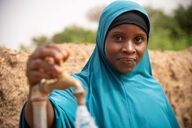
Prepaid meters and mobile application in Niger
Nicolas Réméné / Le Pictorium
LePictorium_0282589.jpg
In the Goudel Maourey district of Niamey in Niger, "smart" water meters have been installed, enabling each family to pay for its water consumption as it occurs, using a mobile phone and an application. This type of prepaid meter allows local residents to regulate their consumption according to their income. This makes it possible to offer access to drinking water at home at a lower cost, with a prepayment system adapted to the irregular incomes of a large proportion of disadvantaged urban populations. In these working-class neighbourhoods on the outskirts of the city centre, access to water is often difficult. The drinking water kiosks installed in family concessions provide access to quality running water for all daily needs. In Niamey, Niger, during the hot season, between the beginning of March and the end of May, many neighbourhoods experience water cuts several times a day, and in some outlying areas these cuts can last for several days. This makes it very difficult for residents to meet their drinking water needs. Residents are obliged to go and buy water from the fountain operators who run standpipes in the neighbourhoods. Temperatures at this time of year can reach 45-47°C, making the water shortage even more difficult.
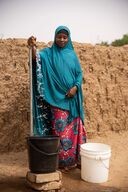
Prepaid meters and mobile application in Niger
Nicolas Réméné / Le Pictorium
LePictorium_0282590.jpg
In the Goudel Maourey district of Niamey in Niger, "smart" water meters have been installed, enabling each family to pay for its water consumption as it occurs, using a mobile phone and an application. This type of prepaid meter allows local residents to regulate their consumption according to their income. This makes it possible to offer access to drinking water at home at a lower cost, with a prepayment system adapted to the irregular incomes of a large proportion of disadvantaged urban populations. In these working-class neighbourhoods on the outskirts of the city centre, access to water is often difficult. The drinking water kiosks installed in family concessions provide access to quality running water for all daily needs. In Niamey, Niger, during the hot season, between the beginning of March and the end of May, many neighbourhoods experience water cuts several times a day, and in some outlying areas these cuts can last for several days. This makes it very difficult for residents to meet their drinking water needs. Residents are obliged to go and buy water from the fountain operators who run standpipes in the neighbourhoods. Temperatures at this time of year can reach 45-47°C, making the water shortage even more difficult.
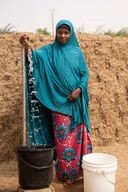
Prepaid meters and mobile application in Niger
Nicolas Réméné / Le Pictorium
LePictorium_0282591.jpg
In the Goudel Maourey district of Niamey in Niger, "smart" water meters have been installed, enabling each family to pay for its water consumption as it occurs, using a mobile phone and an application. This type of prepaid meter allows local residents to regulate their consumption according to their income. This makes it possible to offer access to drinking water at home at a lower cost, with a prepayment system adapted to the irregular incomes of a large proportion of disadvantaged urban populations. In these working-class neighbourhoods on the outskirts of the city centre, access to water is often difficult. The drinking water kiosks installed in family concessions provide access to quality running water for all daily needs. In Niamey, Niger, during the hot season, between the beginning of March and the end of May, many neighbourhoods experience water cuts several times a day, and in some outlying areas these cuts can last for several days. This makes it very difficult for residents to meet their drinking water needs. Residents are obliged to go and buy water from the fountain operators who run standpipes in the neighbourhoods. Temperatures at this time of year can reach 45-47°C, making the water shortage even more difficult.
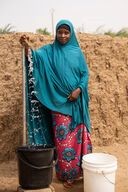
Prepaid meters and mobile application in Niger
Nicolas Réméné / Le Pictorium
LePictorium_0282592.jpg
In the Goudel Maourey district of Niamey in Niger, "smart" water meters have been installed, enabling each family to pay for its water consumption as it occurs, using a mobile phone and an application. This type of prepaid meter allows local residents to regulate their consumption according to their income. This makes it possible to offer access to drinking water at home at a lower cost, with a prepayment system adapted to the irregular incomes of a large proportion of disadvantaged urban populations. In these working-class neighbourhoods on the outskirts of the city centre, access to water is often difficult. The drinking water kiosks installed in family concessions provide access to quality running water for all daily needs. In Niamey, Niger, during the hot season, between the beginning of March and the end of May, many neighbourhoods experience water cuts several times a day, and in some outlying areas these cuts can last for several days. This makes it very difficult for residents to meet their drinking water needs. Residents are obliged to go and buy water from the fountain operators who run standpipes in the neighbourhoods. Temperatures at this time of year can reach 45-47°C, making the water shortage even more difficult.
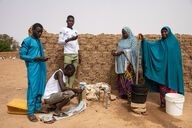
Prepaid meters and mobile application in Niger
Nicolas Réméné / Le Pictorium
LePictorium_0282593.jpg
In the Goudel Maourey district of Niamey in Niger, "smart" water meters have been installed, enabling each family to pay for its water consumption as it occurs, using a mobile phone and an application. This type of prepaid meter allows local residents to regulate their consumption according to their income. This makes it possible to offer access to drinking water at home at a lower cost, with a prepayment system adapted to the irregular incomes of a large proportion of disadvantaged urban populations. In these working-class neighbourhoods on the outskirts of the city centre, access to water is often difficult. The drinking water kiosks installed in family concessions provide access to quality running water for all daily needs. In Niamey, Niger, during the hot season, between the beginning of March and the end of May, many neighbourhoods experience water cuts several times a day, and in some outlying areas these cuts can last for several days. This makes it very difficult for residents to meet their drinking water needs. Residents are obliged to go and buy water from the fountain operators who run standpipes in the neighbourhoods. Temperatures at this time of year can reach 45-47°C, making the water shortage even more difficult.
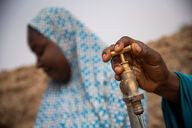
Prepaid meters and mobile application in Niger
Nicolas Réméné / Le Pictorium
LePictorium_0282594.jpg
In the Goudel Maourey district of Niamey in Niger, "smart" water meters have been installed, enabling each family to pay for its water consumption as it occurs, using a mobile phone and an application. This type of prepaid meter allows local residents to regulate their consumption according to their income. This makes it possible to offer access to drinking water at home at a lower cost, with a prepayment system adapted to the irregular incomes of a large proportion of disadvantaged urban populations. In these working-class neighbourhoods on the outskirts of the city centre, access to water is often difficult. The drinking water kiosks installed in family concessions provide access to quality running water for all daily needs. In Niamey, Niger, during the hot season, between the beginning of March and the end of May, many neighbourhoods experience water cuts several times a day, and in some outlying areas these cuts can last for several days. This makes it very difficult for residents to meet their drinking water needs. Residents are obliged to go and buy water from the fountain operators who run standpipes in the neighbourhoods. Temperatures at this time of year can reach 45-47°C, making the water shortage even more difficult.
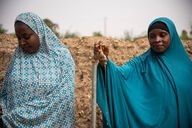
Prepaid meters and mobile application in Niger
Nicolas Réméné / Le Pictorium
LePictorium_0282595.jpg
In the Goudel Maourey district of Niamey in Niger, "smart" water meters have been installed, enabling each family to pay for its water consumption as it occurs, using a mobile phone and an application. This type of prepaid meter allows local residents to regulate their consumption according to their income. This makes it possible to offer access to drinking water at home at a lower cost, with a prepayment system adapted to the irregular incomes of a large proportion of disadvantaged urban populations. In these working-class neighbourhoods on the outskirts of the city centre, access to water is often difficult. The drinking water kiosks installed in family concessions provide access to quality running water for all daily needs. In Niamey, Niger, during the hot season, between the beginning of March and the end of May, many neighbourhoods experience water cuts several times a day, and in some outlying areas these cuts can last for several days. This makes it very difficult for residents to meet their drinking water needs. Residents are obliged to go and buy water from the fountain operators who run standpipes in the neighbourhoods. Temperatures at this time of year can reach 45-47°C, making the water shortage even more difficult.
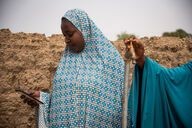
Prepaid meters and mobile application in Niger
Nicolas Réméné / Le Pictorium
LePictorium_0282596.jpg
In the Goudel Maourey district of Niamey in Niger, "smart" water meters have been installed, enabling each family to pay for its water consumption as it occurs, using a mobile phone and an application. This type of prepaid meter allows local residents to regulate their consumption according to their income. This makes it possible to offer access to drinking water at home at a lower cost, with a prepayment system adapted to the irregular incomes of a large proportion of disadvantaged urban populations. In these working-class neighbourhoods on the outskirts of the city centre, access to water is often difficult. The drinking water kiosks installed in family concessions provide access to quality running water for all daily needs. In Niamey, Niger, during the hot season, between the beginning of March and the end of May, many neighbourhoods experience water cuts several times a day, and in some outlying areas these cuts can last for several days. This makes it very difficult for residents to meet their drinking water needs. Residents are obliged to go and buy water from the fountain operators who run standpipes in the neighbourhoods. Temperatures at this time of year can reach 45-47°C, making the water shortage even more difficult.
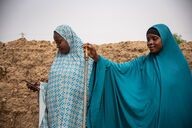
Prepaid meters and mobile application in Niger
Nicolas Réméné / Le Pictorium
LePictorium_0282597.jpg
In the Goudel Maourey district of Niamey in Niger, "smart" water meters have been installed, enabling each family to pay for its water consumption as it occurs, using a mobile phone and an application. This type of prepaid meter allows local residents to regulate their consumption according to their income. This makes it possible to offer access to drinking water at home at a lower cost, with a prepayment system adapted to the irregular incomes of a large proportion of disadvantaged urban populations. In these working-class neighbourhoods on the outskirts of the city centre, access to water is often difficult. The drinking water kiosks installed in family concessions provide access to quality running water for all daily needs. In Niamey, Niger, during the hot season, between the beginning of March and the end of May, many neighbourhoods experience water cuts several times a day, and in some outlying areas these cuts can last for several days. This makes it very difficult for residents to meet their drinking water needs. Residents are obliged to go and buy water from the fountain operators who run standpipes in the neighbourhoods. Temperatures at this time of year can reach 45-47°C, making the water shortage even more difficult.
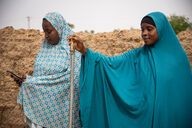
Prepaid meters and mobile application in Niger
Nicolas Réméné / Le Pictorium
LePictorium_0282598.jpg
In the Goudel Maourey district of Niamey in Niger, "smart" water meters have been installed, enabling each family to pay for its water consumption as it occurs, using a mobile phone and an application. This type of prepaid meter allows local residents to regulate their consumption according to their income. This makes it possible to offer access to drinking water at home at a lower cost, with a prepayment system adapted to the irregular incomes of a large proportion of disadvantaged urban populations. In these working-class neighbourhoods on the outskirts of the city centre, access to water is often difficult. The drinking water kiosks installed in family concessions provide access to quality running water for all daily needs. In Niamey, Niger, during the hot season, between the beginning of March and the end of May, many neighbourhoods experience water cuts several times a day, and in some outlying areas these cuts can last for several days. This makes it very difficult for residents to meet their drinking water needs. Residents are obliged to go and buy water from the fountain operators who run standpipes in the neighbourhoods. Temperatures at this time of year can reach 45-47°C, making the water shortage even more difficult.
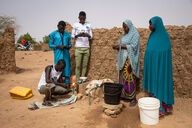
Prepaid meters and mobile application in Niger
Nicolas Réméné / Le Pictorium
LePictorium_0282599.jpg
In the Goudel Maourey district of Niamey in Niger, "smart" water meters have been installed, enabling each family to pay for its water consumption as it occurs, using a mobile phone and an application. This type of prepaid meter allows local residents to regulate their consumption according to their income. This makes it possible to offer access to drinking water at home at a lower cost, with a prepayment system adapted to the irregular incomes of a large proportion of disadvantaged urban populations. In these working-class neighbourhoods on the outskirts of the city centre, access to water is often difficult. The drinking water kiosks installed in family concessions provide access to quality running water for all daily needs. In Niamey, Niger, during the hot season, between the beginning of March and the end of May, many neighbourhoods experience water cuts several times a day, and in some outlying areas these cuts can last for several days. This makes it very difficult for residents to meet their drinking water needs. Residents are obliged to go and buy water from the fountain operators who run standpipes in the neighbourhoods. Temperatures at this time of year can reach 45-47°C, making the water shortage even more difficult.
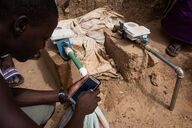
Prepaid meters and mobile application in Niger
Nicolas Réméné / Le Pictorium
LePictorium_0282600.jpg
In the Goudel Maourey district of Niamey in Niger, "smart" water meters have been installed, enabling each family to pay for its water consumption as it occurs, using a mobile phone and an application. This type of prepaid meter allows local residents to regulate their consumption according to their income. This makes it possible to offer access to drinking water at home at a lower cost, with a prepayment system adapted to the irregular incomes of a large proportion of disadvantaged urban populations. In these working-class neighbourhoods on the outskirts of the city centre, access to water is often difficult. The drinking water kiosks installed in family concessions provide access to quality running water for all daily needs. In Niamey, Niger, during the hot season, between the beginning of March and the end of May, many neighbourhoods experience water cuts several times a day, and in some outlying areas these cuts can last for several days. This makes it very difficult for residents to meet their drinking water needs. Residents are obliged to go and buy water from the fountain operators who run standpipes in the neighbourhoods. Temperatures at this time of year can reach 45-47°C, making the water shortage even more difficult.
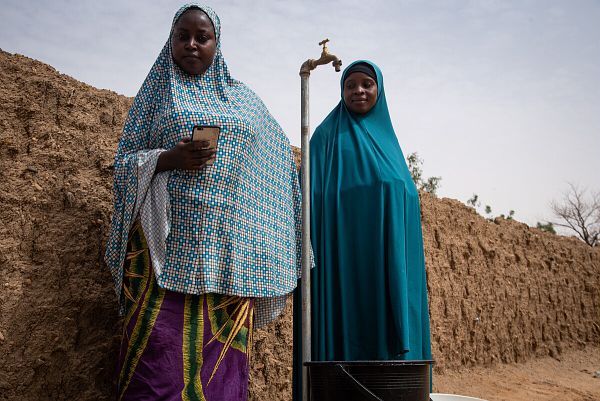
Prepaid meters and mobile application in Niger
Nicolas Réméné / Le Pictorium
LePictorium_0282601.jpg
In the Goudel Maourey district of Niamey in Niger, "smart" water meters have been installed, enabling each family to pay for its water consumption as it occurs, using a mobile phone and an application. This type of prepaid meter allows local residents to regulate their consumption according to their income. This makes it possible to offer access to drinking water at home at a lower cost, with a prepayment system adapted to the irregular incomes of a large proportion of disadvantaged urban populations. In these working-class neighbourhoods on the outskirts of the city centre, access to water is often difficult. The drinking water kiosks installed in family concessions provide access to quality running water for all daily needs. In Niamey, Niger, during the hot season, between the beginning of March and the end of May, many neighbourhoods experience water cuts several times a day, and in some outlying areas these cuts can last for several days. This makes it very difficult for residents to meet their drinking water needs. Residents are obliged to go and buy water from the fountain operators who run standpipes in the neighbourhoods. Temperatures at this time of year can reach 45-47°C, making the water shortage even more difficult.
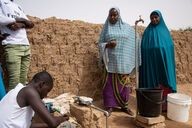
Prepaid meters and mobile application in Niger
Nicolas Réméné / Le Pictorium
LePictorium_0282602.jpg
In the Goudel Maourey district of Niamey in Niger, "smart" water meters have been installed, enabling each family to pay for its water consumption as it occurs, using a mobile phone and an application. This type of prepaid meter allows local residents to regulate their consumption according to their income. This makes it possible to offer access to drinking water at home at a lower cost, with a prepayment system adapted to the irregular incomes of a large proportion of disadvantaged urban populations. In these working-class neighbourhoods on the outskirts of the city centre, access to water is often difficult. The drinking water kiosks installed in family concessions provide access to quality running water for all daily needs. In Niamey, Niger, during the hot season, between the beginning of March and the end of May, many neighbourhoods experience water cuts several times a day, and in some outlying areas these cuts can last for several days. This makes it very difficult for residents to meet their drinking water needs. Residents are obliged to go and buy water from the fountain operators who run standpipes in the neighbourhoods. Temperatures at this time of year can reach 45-47°C, making the water shortage even more difficult.
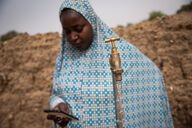
Prepaid meters and mobile application in Niger
Nicolas Réméné / Le Pictorium
LePictorium_0282603.jpg
In the Goudel Maourey district of Niamey in Niger, "smart" water meters have been installed, enabling each family to pay for its water consumption as it occurs, using a mobile phone and an application. This type of prepaid meter allows local residents to regulate their consumption according to their income. This makes it possible to offer access to drinking water at home at a lower cost, with a prepayment system adapted to the irregular incomes of a large proportion of disadvantaged urban populations. In these working-class neighbourhoods on the outskirts of the city centre, access to water is often difficult. The drinking water kiosks installed in family concessions provide access to quality running water for all daily needs. In Niamey, Niger, during the hot season, between the beginning of March and the end of May, many neighbourhoods experience water cuts several times a day, and in some outlying areas these cuts can last for several days. This makes it very difficult for residents to meet their drinking water needs. Residents are obliged to go and buy water from the fountain operators who run standpipes in the neighbourhoods. Temperatures at this time of year can reach 45-47°C, making the water shortage even more difficult.
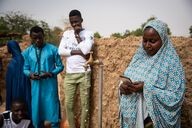
Prepaid meters and mobile application in Niger
Nicolas Réméné / Le Pictorium
LePictorium_0282604.jpg
In the Goudel Maourey district of Niamey in Niger, "smart" water meters have been installed, enabling each family to pay for its water consumption as it occurs, using a mobile phone and an application. This type of prepaid meter allows local residents to regulate their consumption according to their income. This makes it possible to offer access to drinking water at home at a lower cost, with a prepayment system adapted to the irregular incomes of a large proportion of disadvantaged urban populations. In these working-class neighbourhoods on the outskirts of the city centre, access to water is often difficult. The drinking water kiosks installed in family concessions provide access to quality running water for all daily needs. In Niamey, Niger, during the hot season, between the beginning of March and the end of May, many neighbourhoods experience water cuts several times a day, and in some outlying areas these cuts can last for several days. This makes it very difficult for residents to meet their drinking water needs. Residents are obliged to go and buy water from the fountain operators who run standpipes in the neighbourhoods. Temperatures at this time of year can reach 45-47°C, making the water shortage even more difficult.
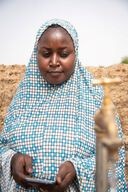
Prepaid meters and mobile application in Niger
Nicolas Réméné / Le Pictorium
LePictorium_0282605.jpg
In the Goudel Maourey district of Niamey in Niger, "smart" water meters have been installed, enabling each family to pay for its water consumption as it occurs, using a mobile phone and an application. This type of prepaid meter allows local residents to regulate their consumption according to their income. This makes it possible to offer access to drinking water at home at a lower cost, with a prepayment system adapted to the irregular incomes of a large proportion of disadvantaged urban populations. In these working-class neighbourhoods on the outskirts of the city centre, access to water is often difficult. The drinking water kiosks installed in family concessions provide access to quality running water for all daily needs. In Niamey, Niger, during the hot season, between the beginning of March and the end of May, many neighbourhoods experience water cuts several times a day, and in some outlying areas these cuts can last for several days. This makes it very difficult for residents to meet their drinking water needs. Residents are obliged to go and buy water from the fountain operators who run standpipes in the neighbourhoods. Temperatures at this time of year can reach 45-47°C, making the water shortage even more difficult.
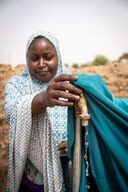
Prepaid meters and mobile application in Niger
Nicolas Réméné / Le Pictorium
LePictorium_0282606.jpg
In the Goudel Maourey district of Niamey in Niger, "smart" water meters have been installed, enabling each family to pay for its water consumption as it occurs, using a mobile phone and an application. This type of prepaid meter allows local residents to regulate their consumption according to their income. This makes it possible to offer access to drinking water at home at a lower cost, with a prepayment system adapted to the irregular incomes of a large proportion of disadvantaged urban populations. In these working-class neighbourhoods on the outskirts of the city centre, access to water is often difficult. The drinking water kiosks installed in family concessions provide access to quality running water for all daily needs. In Niamey, Niger, during the hot season, between the beginning of March and the end of May, many neighbourhoods experience water cuts several times a day, and in some outlying areas these cuts can last for several days. This makes it very difficult for residents to meet their drinking water needs. Residents are obliged to go and buy water from the fountain operators who run standpipes in the neighbourhoods. Temperatures at this time of year can reach 45-47°C, making the water shortage even more difficult.
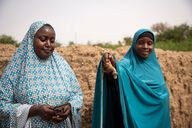
Prepaid meters and mobile application in Niger
Nicolas Réméné / Le Pictorium
LePictorium_0282607.jpg
In the Goudel Maourey district of Niamey in Niger, "smart" water meters have been installed, enabling each family to pay for its water consumption as it occurs, using a mobile phone and an application. This type of prepaid meter allows local residents to regulate their consumption according to their income. This makes it possible to offer access to drinking water at home at a lower cost, with a prepayment system adapted to the irregular incomes of a large proportion of disadvantaged urban populations. In these working-class neighbourhoods on the outskirts of the city centre, access to water is often difficult. The drinking water kiosks installed in family concessions provide access to quality running water for all daily needs. In Niamey, Niger, during the hot season, between the beginning of March and the end of May, many neighbourhoods experience water cuts several times a day, and in some outlying areas these cuts can last for several days. This makes it very difficult for residents to meet their drinking water needs. Residents are obliged to go and buy water from the fountain operators who run standpipes in the neighbourhoods. Temperatures at this time of year can reach 45-47°C, making the water shortage even more difficult.
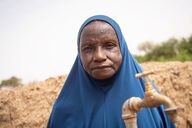
Prepaid meters and mobile application in Niger
Nicolas Réméné / Le Pictorium
LePictorium_0282608.jpg
In the Goudel Maourey district of Niamey in Niger, "smart" water meters have been installed, enabling each family to pay for its water consumption as it occurs, using a mobile phone and an application. This type of prepaid meter allows local residents to regulate their consumption according to their income. This makes it possible to offer access to drinking water at home at a lower cost, with a prepayment system adapted to the irregular incomes of a large proportion of disadvantaged urban populations. In these working-class neighbourhoods on the outskirts of the city centre, access to water is often difficult. The drinking water kiosks installed in family concessions provide access to quality running water for all daily needs. In Niamey, Niger, during the hot season, between the beginning of March and the end of May, many neighbourhoods experience water cuts several times a day, and in some outlying areas these cuts can last for several days. This makes it very difficult for residents to meet their drinking water needs. Residents are obliged to go and buy water from the fountain operators who run standpipes in the neighbourhoods. Temperatures at this time of year can reach 45-47°C, making the water shortage even more difficult.
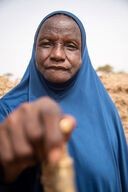
Prepaid meters and mobile application in Niger
Nicolas Réméné / Le Pictorium
LePictorium_0282609.jpg
In the Goudel Maourey district of Niamey in Niger, "smart" water meters have been installed, enabling each family to pay for its water consumption as it occurs, using a mobile phone and an application. This type of prepaid meter allows local residents to regulate their consumption according to their income. This makes it possible to offer access to drinking water at home at a lower cost, with a prepayment system adapted to the irregular incomes of a large proportion of disadvantaged urban populations. In these working-class neighbourhoods on the outskirts of the city centre, access to water is often difficult. The drinking water kiosks installed in family concessions provide access to quality running water for all daily needs. In Niamey, Niger, during the hot season, between the beginning of March and the end of May, many neighbourhoods experience water cuts several times a day, and in some outlying areas these cuts can last for several days. This makes it very difficult for residents to meet their drinking water needs. Residents are obliged to go and buy water from the fountain operators who run standpipes in the neighbourhoods. Temperatures at this time of year can reach 45-47°C, making the water shortage even more difficult.
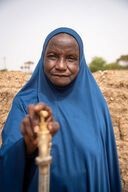
Prepaid meters and mobile application in Niger
Nicolas Réméné / Le Pictorium
LePictorium_0282610.jpg
In the Goudel Maourey district of Niamey in Niger, "smart" water meters have been installed, enabling each family to pay for its water consumption as it occurs, using a mobile phone and an application. This type of prepaid meter allows local residents to regulate their consumption according to their income. This makes it possible to offer access to drinking water at home at a lower cost, with a prepayment system adapted to the irregular incomes of a large proportion of disadvantaged urban populations. In these working-class neighbourhoods on the outskirts of the city centre, access to water is often difficult. The drinking water kiosks installed in family concessions provide access to quality running water for all daily needs. In Niamey, Niger, during the hot season, between the beginning of March and the end of May, many neighbourhoods experience water cuts several times a day, and in some outlying areas these cuts can last for several days. This makes it very difficult for residents to meet their drinking water needs. Residents are obliged to go and buy water from the fountain operators who run standpipes in the neighbourhoods. Temperatures at this time of year can reach 45-47°C, making the water shortage even more difficult.
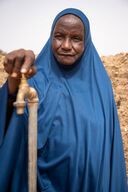
Prepaid meters and mobile application in Niger
Nicolas Réméné / Le Pictorium
LePictorium_0282611.jpg
In the Goudel Maourey district of Niamey in Niger, "smart" water meters have been installed, enabling each family to pay for its water consumption as it occurs, using a mobile phone and an application. This type of prepaid meter allows local residents to regulate their consumption according to their income. This makes it possible to offer access to drinking water at home at a lower cost, with a prepayment system adapted to the irregular incomes of a large proportion of disadvantaged urban populations. In these working-class neighbourhoods on the outskirts of the city centre, access to water is often difficult. The drinking water kiosks installed in family concessions provide access to quality running water for all daily needs. In Niamey, Niger, during the hot season, between the beginning of March and the end of May, many neighbourhoods experience water cuts several times a day, and in some outlying areas these cuts can last for several days. This makes it very difficult for residents to meet their drinking water needs. Residents are obliged to go and buy water from the fountain operators who run standpipes in the neighbourhoods. Temperatures at this time of year can reach 45-47°C, making the water shortage even more difficult.
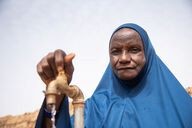
Prepaid meters and mobile application in Niger
Nicolas Réméné / Le Pictorium
LePictorium_0282612.jpg
In the Goudel Maourey district of Niamey in Niger, "smart" water meters have been installed, enabling each family to pay for its water consumption as it occurs, using a mobile phone and an application. This type of prepaid meter allows local residents to regulate their consumption according to their income. This makes it possible to offer access to drinking water at home at a lower cost, with a prepayment system adapted to the irregular incomes of a large proportion of disadvantaged urban populations. In these working-class neighbourhoods on the outskirts of the city centre, access to water is often difficult. The drinking water kiosks installed in family concessions provide access to quality running water for all daily needs. In Niamey, Niger, during the hot season, between the beginning of March and the end of May, many neighbourhoods experience water cuts several times a day, and in some outlying areas these cuts can last for several days. This makes it very difficult for residents to meet their drinking water needs. Residents are obliged to go and buy water from the fountain operators who run standpipes in the neighbourhoods. Temperatures at this time of year can reach 45-47°C, making the water shortage even more difficult.
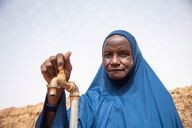
Prepaid meters and mobile application in Niger
Nicolas Réméné / Le Pictorium
LePictorium_0282613.jpg
In the Goudel Maourey district of Niamey in Niger, "smart" water meters have been installed, enabling each family to pay for its water consumption as it occurs, using a mobile phone and an application. This type of prepaid meter allows local residents to regulate their consumption according to their income. This makes it possible to offer access to drinking water at home at a lower cost, with a prepayment system adapted to the irregular incomes of a large proportion of disadvantaged urban populations. In these working-class neighbourhoods on the outskirts of the city centre, access to water is often difficult. The drinking water kiosks installed in family concessions provide access to quality running water for all daily needs. In Niamey, Niger, during the hot season, between the beginning of March and the end of May, many neighbourhoods experience water cuts several times a day, and in some outlying areas these cuts can last for several days. This makes it very difficult for residents to meet their drinking water needs. Residents are obliged to go and buy water from the fountain operators who run standpipes in the neighbourhoods. Temperatures at this time of year can reach 45-47°C, making the water shortage even more difficult.
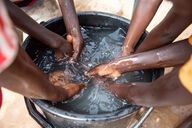
Prepaid meters and mobile application in Niger
Nicolas Réméné / Le Pictorium
LePictorium_0282614.jpg
In the Goudel Maourey district of Niamey in Niger, "smart" water meters have been installed, enabling each family to pay for its water consumption as it occurs, using a mobile phone and an application. This type of prepaid meter allows local residents to regulate their consumption according to their income. This makes it possible to offer access to drinking water at home at a lower cost, with a prepayment system adapted to the irregular incomes of a large proportion of disadvantaged urban populations. In these working-class neighbourhoods on the outskirts of the city centre, access to water is often difficult. The drinking water kiosks installed in family concessions provide access to quality running water for all daily needs. In Niamey, Niger, during the hot season, between the beginning of March and the end of May, many neighbourhoods experience water cuts several times a day, and in some outlying areas these cuts can last for several days. This makes it very difficult for residents to meet their drinking water needs. Residents are obliged to go and buy water from the fountain operators who run standpipes in the neighbourhoods. Temperatures at this time of year can reach 45-47°C, making the water shortage even more difficult.

Prepaid meters and mobile application in Niger
Nicolas Réméné / Le Pictorium
LePictorium_0282615.jpg
In the Goudel Maourey district of Niamey in Niger, "smart" water meters have been installed, enabling each family to pay for its water consumption as it occurs, using a mobile phone and an application. This type of prepaid meter allows local residents to regulate their consumption according to their income. This makes it possible to offer access to drinking water at home at a lower cost, with a prepayment system adapted to the irregular incomes of a large proportion of disadvantaged urban populations. In these working-class neighbourhoods on the outskirts of the city centre, access to water is often difficult. The drinking water kiosks installed in family concessions provide access to quality running water for all daily needs. In Niamey, Niger, during the hot season, between the beginning of March and the end of May, many neighbourhoods experience water cuts several times a day, and in some outlying areas these cuts can last for several days. This makes it very difficult for residents to meet their drinking water needs. Residents are obliged to go and buy water from the fountain operators who run standpipes in the neighbourhoods. Temperatures at this time of year can reach 45-47°C, making the water shortage even more difficult.

Prepaid meters and mobile application in Niger
Nicolas Réméné / Le Pictorium
LePictorium_0282616.jpg
In the Goudel Maourey district of Niamey in Niger, "smart" water meters have been installed, enabling each family to pay for its water consumption as it occurs, using a mobile phone and an application. This type of prepaid meter allows local residents to regulate their consumption according to their income. This makes it possible to offer access to drinking water at home at a lower cost, with a prepayment system adapted to the irregular incomes of a large proportion of disadvantaged urban populations. In these working-class neighbourhoods on the outskirts of the city centre, access to water is often difficult. The drinking water kiosks installed in family concessions provide access to quality running water for all daily needs. In Niamey, Niger, during the hot season, between the beginning of March and the end of May, many neighbourhoods experience water cuts several times a day, and in some outlying areas these cuts can last for several days. This makes it very difficult for residents to meet their drinking water needs. Residents are obliged to go and buy water from the fountain operators who run standpipes in the neighbourhoods. Temperatures at this time of year can reach 45-47°C, making the water shortage even more difficult.

Prepaid meters and mobile application in Niger
Nicolas Réméné / Le Pictorium
LePictorium_0282617.jpg
In the Goudel Maourey district of Niamey in Niger, "smart" water meters have been installed, enabling each family to pay for its water consumption as it occurs, using a mobile phone and an application. This type of prepaid meter allows local residents to regulate their consumption according to their income. This makes it possible to offer access to drinking water at home at a lower cost, with a prepayment system adapted to the irregular incomes of a large proportion of disadvantaged urban populations. In these working-class neighbourhoods on the outskirts of the city centre, access to water is often difficult. The drinking water kiosks installed in family concessions provide access to quality running water for all daily needs. In Niamey, Niger, during the hot season, between the beginning of March and the end of May, many neighbourhoods experience water cuts several times a day, and in some outlying areas these cuts can last for several days. This makes it very difficult for residents to meet their drinking water needs. Residents are obliged to go and buy water from the fountain operators who run standpipes in the neighbourhoods. Temperatures at this time of year can reach 45-47°C, making the water shortage even more difficult.

Prepaid meters and mobile application in Niger
Nicolas Réméné / Le Pictorium
LePictorium_0282618.jpg
In the Goudel Maourey district of Niamey in Niger, "smart" water meters have been installed, enabling each family to pay for its water consumption as it occurs, using a mobile phone and an application. This type of prepaid meter allows local residents to regulate their consumption according to their income. This makes it possible to offer access to drinking water at home at a lower cost, with a prepayment system adapted to the irregular incomes of a large proportion of disadvantaged urban populations. In these working-class neighbourhoods on the outskirts of the city centre, access to water is often difficult. The drinking water kiosks installed in family concessions provide access to quality running water for all daily needs. In Niamey, Niger, during the hot season, between the beginning of March and the end of May, many neighbourhoods experience water cuts several times a day, and in some outlying areas these cuts can last for several days. This makes it very difficult for residents to meet their drinking water needs. Residents are obliged to go and buy water from the fountain operators who run standpipes in the neighbourhoods. Temperatures at this time of year can reach 45-47°C, making the water shortage even more difficult.
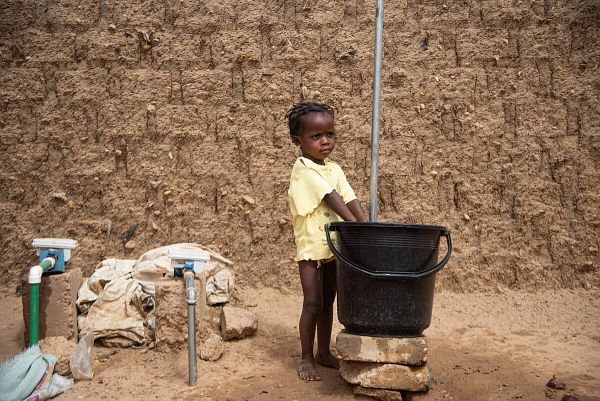
Prepaid meters and mobile application in Niger
Nicolas Réméné / Le Pictorium
LePictorium_0282619.jpg
In the Goudel Maourey district of Niamey in Niger, "smart" water meters have been installed, enabling each family to pay for its water consumption as it occurs, using a mobile phone and an application. This type of prepaid meter allows local residents to regulate their consumption according to their income. This makes it possible to offer access to drinking water at home at a lower cost, with a prepayment system adapted to the irregular incomes of a large proportion of disadvantaged urban populations. In these working-class neighbourhoods on the outskirts of the city centre, access to water is often difficult. The drinking water kiosks installed in family concessions provide access to quality running water for all daily needs. In Niamey, Niger, during the hot season, between the beginning of March and the end of May, many neighbourhoods experience water cuts several times a day, and in some outlying areas these cuts can last for several days. This makes it very difficult for residents to meet their drinking water needs. Residents are obliged to go and buy water from the fountain operators who run standpipes in the neighbourhoods. Temperatures at this time of year can reach 45-47°C, making the water shortage even more difficult.
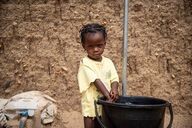
Prepaid meters and mobile application in Niger
Nicolas Réméné / Le Pictorium
LePictorium_0282620.jpg
In the Goudel Maourey district of Niamey in Niger, "smart" water meters have been installed, enabling each family to pay for its water consumption as it occurs, using a mobile phone and an application. This type of prepaid meter allows local residents to regulate their consumption according to their income. This makes it possible to offer access to drinking water at home at a lower cost, with a prepayment system adapted to the irregular incomes of a large proportion of disadvantaged urban populations. In these working-class neighbourhoods on the outskirts of the city centre, access to water is often difficult. The drinking water kiosks installed in family concessions provide access to quality running water for all daily needs. In Niamey, Niger, during the hot season, between the beginning of March and the end of May, many neighbourhoods experience water cuts several times a day, and in some outlying areas these cuts can last for several days. This makes it very difficult for residents to meet their drinking water needs. Residents are obliged to go and buy water from the fountain operators who run standpipes in the neighbourhoods. Temperatures at this time of year can reach 45-47°C, making the water shortage even more difficult.

Prepaid meters and mobile application in Niger
Nicolas Réméné / Le Pictorium
LePictorium_0282621.jpg
In the Goudel Maourey district of Niamey in Niger, "smart" water meters have been installed, enabling each family to pay for its water consumption as it occurs, using a mobile phone and an application. This type of prepaid meter allows local residents to regulate their consumption according to their income. This makes it possible to offer access to drinking water at home at a lower cost, with a prepayment system adapted to the irregular incomes of a large proportion of disadvantaged urban populations. In these working-class neighbourhoods on the outskirts of the city centre, access to water is often difficult. The drinking water kiosks installed in family concessions provide access to quality running water for all daily needs. In Niamey, Niger, during the hot season, between the beginning of March and the end of May, many neighbourhoods experience water cuts several times a day, and in some outlying areas these cuts can last for several days. This makes it very difficult for residents to meet their drinking water needs. Residents are obliged to go and buy water from the fountain operators who run standpipes in the neighbourhoods. Temperatures at this time of year can reach 45-47°C, making the water shortage even more difficult.
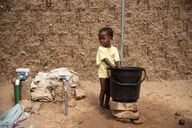
Prepaid meters and mobile application in Niger
Nicolas Réméné / Le Pictorium
LePictorium_0282622.jpg
In the Goudel Maourey district of Niamey in Niger, "smart" water meters have been installed, enabling each family to pay for its water consumption as it occurs, using a mobile phone and an application. This type of prepaid meter allows local residents to regulate their consumption according to their income. This makes it possible to offer access to drinking water at home at a lower cost, with a prepayment system adapted to the irregular incomes of a large proportion of disadvantaged urban populations. In these working-class neighbourhoods on the outskirts of the city centre, access to water is often difficult. The drinking water kiosks installed in family concessions provide access to quality running water for all daily needs. In Niamey, Niger, during the hot season, between the beginning of March and the end of May, many neighbourhoods experience water cuts several times a day, and in some outlying areas these cuts can last for several days. This makes it very difficult for residents to meet their drinking water needs. Residents are obliged to go and buy water from the fountain operators who run standpipes in the neighbourhoods. Temperatures at this time of year can reach 45-47°C, making the water shortage even more difficult.
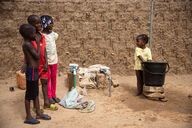
Prepaid meters and mobile application in Niger
Nicolas Réméné / Le Pictorium
LePictorium_0282623.jpg
In the Goudel Maourey district of Niamey in Niger, "smart" water meters have been installed, enabling each family to pay for its water consumption as it occurs, using a mobile phone and an application. This type of prepaid meter allows local residents to regulate their consumption according to their income. This makes it possible to offer access to drinking water at home at a lower cost, with a prepayment system adapted to the irregular incomes of a large proportion of disadvantaged urban populations. In these working-class neighbourhoods on the outskirts of the city centre, access to water is often difficult. The drinking water kiosks installed in family concessions provide access to quality running water for all daily needs. In Niamey, Niger, during the hot season, between the beginning of March and the end of May, many neighbourhoods experience water cuts several times a day, and in some outlying areas these cuts can last for several days. This makes it very difficult for residents to meet their drinking water needs. Residents are obliged to go and buy water from the fountain operators who run standpipes in the neighbourhoods. Temperatures at this time of year can reach 45-47°C, making the water shortage even more difficult.
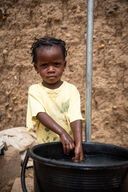
Prepaid meters and mobile application in Niger
Nicolas Réméné / Le Pictorium
LePictorium_0282624.jpg
In the Goudel Maourey district of Niamey in Niger, "smart" water meters have been installed, enabling each family to pay for its water consumption as it occurs, using a mobile phone and an application. This type of prepaid meter allows local residents to regulate their consumption according to their income. This makes it possible to offer access to drinking water at home at a lower cost, with a prepayment system adapted to the irregular incomes of a large proportion of disadvantaged urban populations. In these working-class neighbourhoods on the outskirts of the city centre, access to water is often difficult. The drinking water kiosks installed in family concessions provide access to quality running water for all daily needs. In Niamey, Niger, during the hot season, between the beginning of March and the end of May, many neighbourhoods experience water cuts several times a day, and in some outlying areas these cuts can last for several days. This makes it very difficult for residents to meet their drinking water needs. Residents are obliged to go and buy water from the fountain operators who run standpipes in the neighbourhoods. Temperatures at this time of year can reach 45-47°C, making the water shortage even more difficult.
Next page
